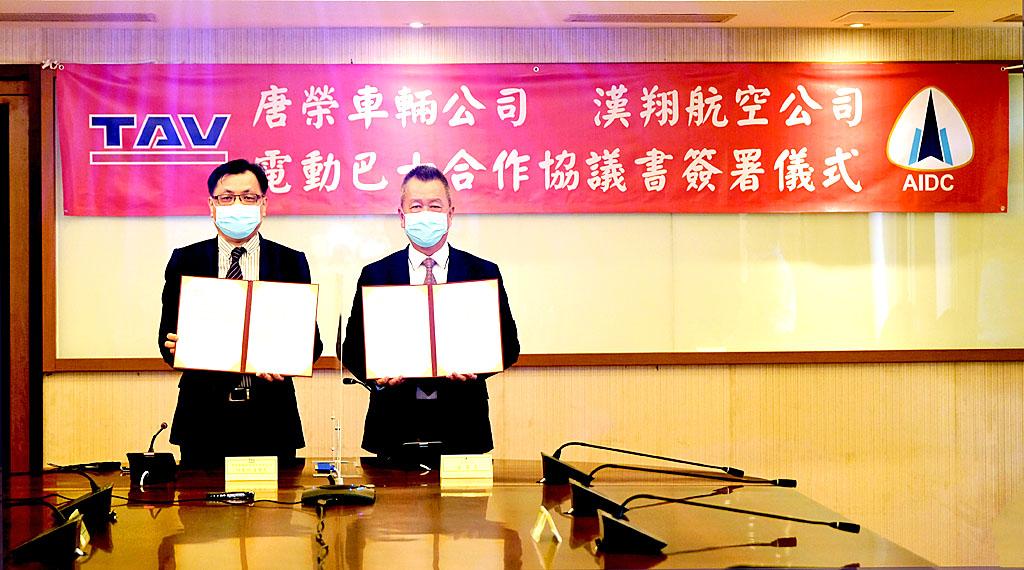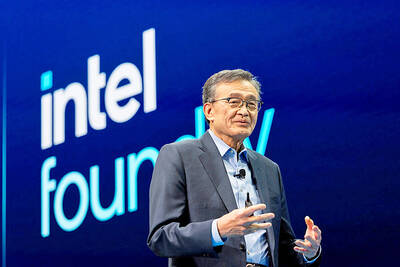A domestic aerospace company and train car manufacturer have teamed up to explore the electric bus market, and expect to unveil a new lightweight model seven months from now that they hope to market overseas.
Aerospace Industrial Development Corp (AIDC, 漢翔航空), a maker of military and civil aviation products, said in a statement yesterday that AIDC chairman Hu Kai-hung (胡開宏) had signed a strategic alliance memorandum of understanding with Tangeng Advanced Vehicles Co (TAV, 唐榮車輛) chairman Jonathan Ho (何義純).
TAV is Taiwan’s biggest maker of passenger and freight cars for railways, as well as commercial vehicles, such as buses and trucks.

Photo courtesy of Aerospace Industrial Development Corp
The two companies intend to build a low-floor bus that is fully electric, with special focus given to the construction of the vehicle control unit and the cable harness assembly, as well as the development of a lightweight structural frame, the statement said.
If successful, the bus would become Taiwan’s only fully electric, low-floor bus made from a lightweight aluminum alloy.
AIDC and TAV expect to begin selling the model in the first quarter of next year, the statement said.
Through the partnership, the firms aim to support the government’s goal of all long-distance passenger buses in Taiwan being electric and built domestically by 2030, Hu said in the statement.
However, the companies are also hoping to expand into international markets, such as Japan and the US.
Hu also said that the two firms were attempting to build a larger ecosystem to support the project’s development, adding that TAV signed a deal with Tatung Co (大同) earlier this year to provide some of the power systems for the planned bus.

Mercuries Life Insurance Co (三商美邦人壽) shares surged to a seven-month high this week after local media reported that E.Sun Financial Holding Co (玉山金控) had outbid CTBC Financial Holding Co (中信金控) in the financially strained insurer’s ongoing sale process. Shares of the mid-sized life insurer climbed 5.8 percent this week to NT$6.72, extending a nearly 18 percent rally over the past month, as investors bet on the likelihood of an impending takeover. The final round of bidding closed on Thursday, marking a critical step in the 32-year-old insurer’s search for a buyer after years of struggling to meet capital adequacy requirements. Local media reports

TECHNOLOGICAL RIVALRY: The artificial intelligence chip competition among multiple players would likely intensify over the next two years, a Quanta official said Quanta Computer Inc (廣達), which makes servers and laptops on a contract basis, yesterday said its shipments of artificial intelligence (AI) servers powered by Nvidia Corp’s GB300 chips have increased steadily since last month, should surpass those of the GB200 models this quarter. The production of GB300 servers has gone much more smoothly than that of the GB200, with shipments projected to increase sharply next month, Quanta executive vice president Mike Yang (楊麒令) said on the sidelines of a technology forum in Taipei. While orders for GB200 servers gradually decrease, the production transition between the two server models has been

US sports leagues rushed to get in on the multi-billion US dollar bonanza of legalized betting, but the arrest of an National Basketball Association (NBA) coach and player in two sprawling US federal investigations show the potential cost of partnering with the gambling industry. Portland Trail Blazers coach Chauncey Billups, a former Detroit Pistons star and an NBA Hall of Famer, was arrested for his alleged role in rigged illegal poker games that prosecutors say were tied to Mafia crime families. Miami Heat guard Terry Rozier was charged with manipulating his play for the benefit of bettors and former NBA player and

BETTER THAN EXPECTED: The firm’s Q3 results exceeded its projections, based on ‘the underlying strength of our core markets,’ chief financial officer Dave Zinsner said Intel Corp returned to profitability and gave an upbeat revenue forecast after PC demand grew, suggesting that it is making progress on a long and challenging comeback attempt. In the third quarter, revenue rose 3 percent to US$13.7 billion. The Santa Clara, California-based company posted its first quarterly net income since the end of 2023, with earnings per share of US$0.23, excluding some items. Analysts had estimated sales of US$13.2 billion and earnings per share of US$0.01 on average, according to data compiled by Bloomberg. Fourth-quarter sales would be roughly US$13.3 billion, the company said in a statement on Thursday. Intel shares gained about